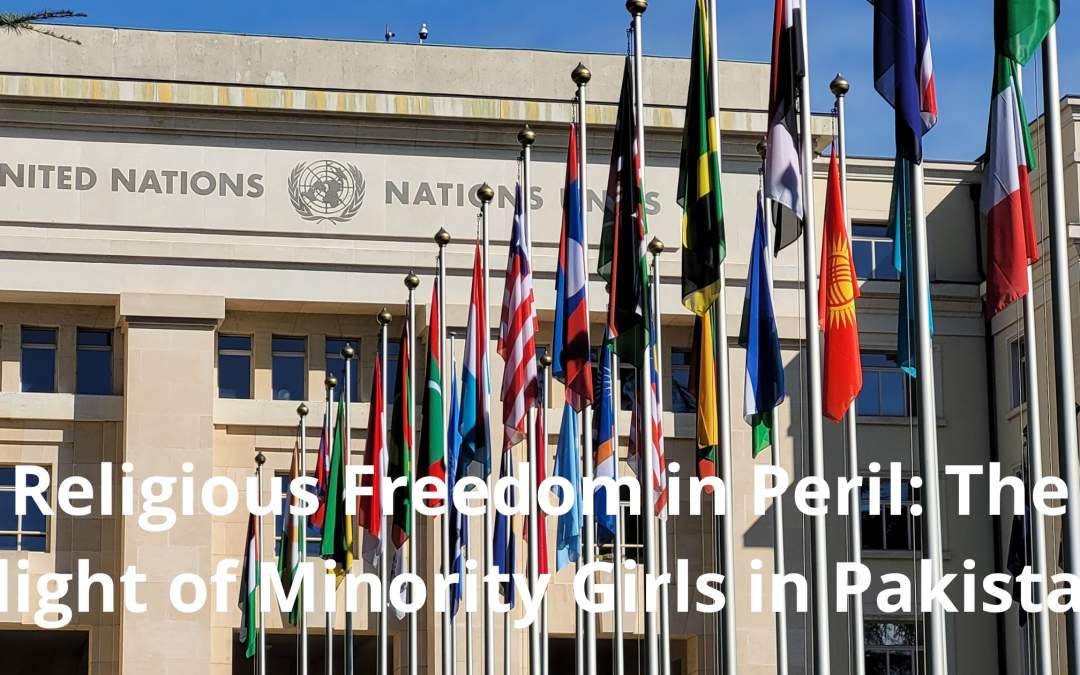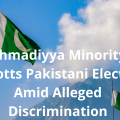By CAP Liberté de Conscience April 2024
In a recent statement, a group of United Nations human rights experts expressed deep concern over the lack of protection for minority girls in Pakistan, who face the alarming threat of forced religious conversions and marriages. This issue, which has long plagued the country, highlights the ongoing struggle for religious freedom and the urgent need for comprehensive reforms to safeguard the rights of vulnerable populations.
Pakistan, a nation with a rich cultural tapestry and a predominantly Muslim population, has long grappled with the complex dynamics of religious diversity and the challenges faced by its religious minorities. The recent statement by the UN experts sheds light on the dire situation faced by young girls from religious minority communities, particularly Hindus, Christians, and Ahmadis, who are often targeted for forced conversions and marriages.
The UN experts, comprising the Special Rapporteur on freedom of religion or belief, the Special Rapporteur on violence against women and girls, and the Working Group on discrimination against women and girls, expressed their alarm at the “lack of adequate measures to prevent and address” these human rights violations. They emphasized the “serious and systematic nature” of the problem, which has persisted despite previous calls for action by the international community.
The issue of forced religious conversions and marriages is not a new phenomenon in Pakistan. Over the years, numerous reports and studies have documented the harrowing experiences of minority girls, who are often abducted, coerced, and forced to convert to Islam and marry their abductors. These incidents have not only shattered the lives of the victims and their families but have also undermined the country’s commitment to upholding religious freedom and the rights of its citizens.
One of the most concerning aspects of this crisis is the perceived complicity of state authorities in some cases. The UN experts noted that “in many cases, the authorities have failed to act, or have even been complicit, in supporting these abductions and forced conversions.” This lack of effective intervention and accountability has only exacerbated the problem, leaving minority communities feeling vulnerable and abandoned by the very institutions that should be protecting them.
The issue of forced religious conversions and marriages is deeply rooted in the complex social, cultural, and religious dynamics of Pakistan. In some cases, these practices are driven by a misguided interpretation of religious teachings, where the conversion of non-Muslims is seen as a religious duty. In other instances, they are fueled by economic factors, as the abduction and forced marriage of minority girls can be a lucrative business for criminal networks.
To address this crisis, the UN experts have called on the Pakistani government to take immediate and concrete measures to protect the rights of minority girls. This includes strengthening legal frameworks, improving law enforcement and judicial responses, and ensuring that perpetrators are held accountable. They have also emphasized the need for comprehensive education and awareness campaigns to challenge the societal norms and biases that enable these human rights violations.
The Pakistani government has acknowledged the gravity of the situation and has taken some steps to address the issue. In recent years, the country has enacted laws aimed at curbing forced conversions and protecting the rights of religious minorities. However, the implementation of these laws has been inconsistent, and the problem continues to persist.
One of the key challenges in addressing this issue is the deeply entrenched social and cultural norms that perpetuate the marginalization of religious minorities. In many communities, the conversion and marriage of minority girls are seen as acceptable, or even desirable, practices. Challenging these deeply rooted beliefs and practices will require a sustained and multifaceted approach, involving not only legal reforms but also extensive efforts to promote interfaith dialogue, education, and social cohesion.
The situation of religious freedom in Pakistan is further complicated by the broader political and security challenges facing the country. The rise of religious extremism and the ongoing tensions between different religious and ethnic groups have created an environment of instability and insecurity, which has disproportionately impacted religious minorities.
In this context, the UN experts’ statement serves as a powerful reminder of the urgent need for the Pakistani government to prioritize the protection of religious freedom and the rights of its minority citizens. Failure to do so not only undermines the country’s international reputation but also threatens the social fabric and long-term stability of the nation.
To address this crisis effectively, the Pakistani government must adopt a comprehensive and holistic approach. This should include strengthening the legal framework, improving law enforcement and judicial responses, and ensuring that perpetrators are held accountable. Additionally, the government must invest in education and awareness campaigns to challenge the societal norms and biases that enable these human rights violations.
Moreover, the government must engage with religious and community leaders to promote interfaith dialogue and understanding. By fostering a culture of respect and tolerance, the government can help to address the root causes of religious intolerance and discrimination.
The plight of minority girls in Pakistan is a stark reminder of the ongoing struggle for religious freedom and the urgent need for comprehensive reforms to protect the rights of vulnerable populations. The UN experts’ statement has shone a spotlight on this critical issue, and it is now up to the Pakistani government to take decisive action to safeguard the fundamental rights of all its citizens, regardless of their religious affiliation.
As the world watches closely, the Pakistani government must demonstrate its commitment to upholding the principles of religious freedom and human rights. Failure to do so will not only undermine the country’s international standing but also jeopardize the well-being and security of its most vulnerable citizens. The time for action is now, and the future of religious freedom in Pakistan hangs in the balance.




